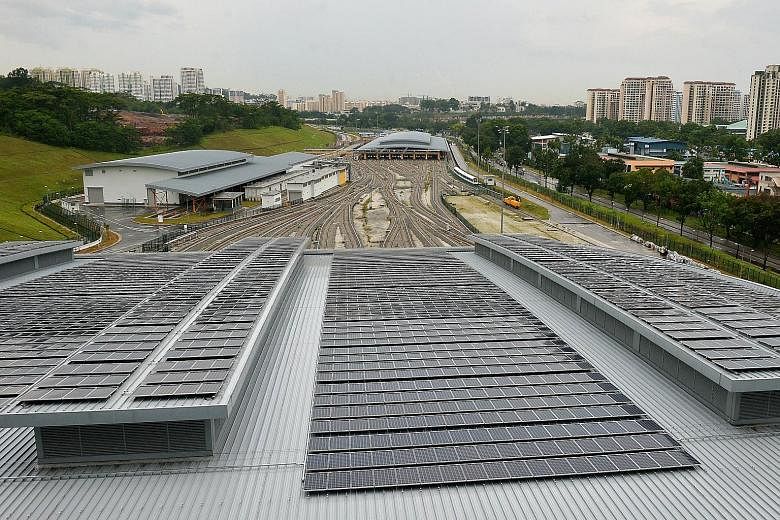The deal to steer the world away from catastrophic climate change has been struck and nations know it is now time to enact their action plans.
Singapore, with its existing suite of initiatives, is on the right track, experts here told The Straits Times. But there are other areas that could be looked into to make Singapore greener in the long term, they said.
"Singapore has already phased out coal and oil in its electric power sector and is thus on track for the next 10 to 15 years with its current measures," said Professor Armin Aberle, chief executive of the Solar Energy Research Institute of Singapore at the National University of Singapore (NUS).
But beyond 2050, Singapore needs to phase out natural gas - which now makes up 95.5 per cent of the fuel mix - and replace it with cleaner alternative energy.
Prof Aberle said: "The main pillar will be solar energy, whereby a significant part of these future solar power plants could be on offshore platforms."
Singapore is already moving in this direction. Last month, national water agency PUB announced that it is embarking on a feasibility study to assess the possibility of installing solar panels at its reservoirs and other facilities.
Under the Government's SolarNova programme, the Housing Board has also committed to a target of 220 megawatt-peak (MWp ) of power generated through solar panels at some 5,500 blocks.
So far, about 124 MWp worth of solar panels have been procured and committed for installation on HDB blocks. The electricity generated could be used for common services such as lifts, lighting in common areas and pumps.
Singapore has pledged that its greenhouse gas emissions will peak around 2030 at the equivalent of about 65 million tonnes of carbon dioxide, even if the economy grows. It will also be greener economically, reducing by more than a third the amount of greenhouse gases emitted to achieve each dollar of gross domestic product.
Professor Subodh Mhaisalkar, executive director of the Energy Research Institute at Nanyang Technological University, said the power-generation switch from fuel oil to natural gas, as well as increasing solar energy generation, "addresses more or less the only opportunities available to Singapore".
This, he noted, was because Singapore is a "renewable energy-disadvantaged nation", with limited access to other alternative energy options such as hydroelectric, wind or geothermal power.
Foreign Minister Vivian Balakrishnan had said that Singapore will strive to curb its emissions in other ways.
This includes promoting greater energy efficiency in the domestic and industrial sectors; pushing for more green buildings; aiming for the petrochemical industry to continually upgrade using the least pollutive and most efficient technologies available, as well as improving public transport.
All new HDB projects launched since January last year have eco-features, such as LED lighting with motion sensors in public areas, that minimise energy use. New estates are also designed to optimise wind flow and reduce heat gain, lowering the need for air-conditioning.
The push for green buildings is also in line with the Government's Smart Nation initiative, where resources are better managed by technology.
Mr Saulo Spaolanse, country president for energy management firm Singapore Schneider Electric, said the nation should continue to leverage smart technology both in homes and in the industry.
"If we are able to seize this initiative and ride on the momentum of the Paris agreement, Singapore will be well positioned to meet and exceed (its) emissions target," he said.
Research associate Melissa Low of the NUS Energy Studies Institute said: "More importantly, Singaporeans need to change their consumption behaviour - use less energy, buy less and waste less. Without a mindset shift, efforts by the Government may not yield optimal results."
- Additional reporting by Janice Heng
SEE OPINION, FORUM & BUSINESS
Paris climate agreement good for more than the environment


